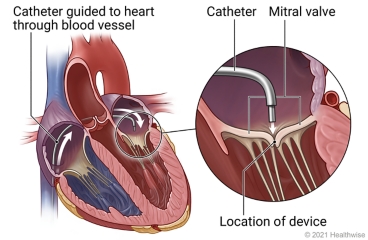Transcatheter Mitral Valve Repair (TMVR): Before Your Procedure

What is transcatheter mitral valve repair?
Transcatheter mitral valve repair (TMVR) is a procedure to help the mitral valve close better. The mitral valve separates the left upper chamber (left atrium) and left lower chamber (left ventricle) of the heart. It is formed from two downward-facing flaps. The valve's job is to make sure the blood flows in only one direction, from the upper to the lower chamber.
Mitral valve regurgitation happens when the valve doesn't close all the way. Blood leaks backward, or regurgitates, into the upper chamber of the heart. This causes the heart to work harder to pump blood.
In TMVR, one or more small clips hold parts of the valve flaps together. These help the valve close better and reduce the amount of blood that leaks into the upper chamber. A TMVR may help reduce symptoms like shortness of breath and tiredness.
You will likely be asleep for the procedure. Your doctor makes a small cut in your groin. A thin flexible tube (catheter) with tools inside it is put inside your blood vessel and carefully guided to your heart. Your doctor moves the tip of the catheter to the valve and attaches one or more clips to the valve flaps. These clips remain in your heart.
You may stay in the hospital for up to a few days.
How do you prepare for the procedure?
Procedures can be stressful. This information will help you understand what you can expect. And it will help you safely prepare for your procedure.
 Preparing for the procedure
Preparing for the procedure
- Be sure you have someone to take you home. Anesthesia and pain medicine will make it unsafe for you to drive or get home on your own.
- Understand exactly what procedure is planned, along with the risks, benefits, and other options.
- Tell your doctor ALL the medicines and natural health products you take. Some may increase the risk of problems during your procedure. Your doctor will tell you if you should stop taking any of them before the procedure and how soon to do it.
- If you take aspirin or some other blood thinner, ask your doctor if you should stop taking it before your procedure. Make sure that you understand exactly what your doctor wants you to do. These medicines increase the risk of bleeding.
- Make sure your doctor and the hospital have a copy of your advance care plan. If you don't have one, you may want to prepare one. It lets others know your health care wishes. It's a good thing to have before any type of surgery or procedure.
What happens on the day of the procedure?
- Follow the instructions exactly about when to stop eating and drinking. If you don't, your procedure may be cancelled. If your doctor told you to take your medicines on the day of the procedure, take them with only a sip of water.
- Follow your doctor's instructions about when to bathe or shower before your procedure. Do not apply lotions, perfumes, deodorants, or nail polish.
- Do not shave the surgical site yourself.
- Take off all jewellery and piercings. And take out contact lenses, if you wear them.
 At the hospital or surgery centre
At the hospital or surgery centre
- Bring a picture ID.
- You will be kept comfortable and safe by your anesthesia provider. The anesthesia will likely make you sleep. You won't feel pain when the catheter is put in the blood vessel.
- The procedure will take about 3 to 4 hours.
After the procedure
- After the procedure, pressure may be applied to the area where the catheter was put into your blood vessel. This will help prevent bleeding. A small device may also be used to close the blood vessel. You may have a bandage or a compression device on the catheter site.
- You will need to lie still and keep your leg straight for up to a few hours. A weighted bag may be put on your leg to help you keep it still.
- Your care team will check your heart rate and blood pressure. They will also check the catheter site for bleeding.
- You may have a bruise or a small lump where the catheter was put in your blood vessel. This is normal and will go away.
- For a while after the procedure, you'll have a catheter in an artery in your arm. It is used to check your blood pressure and take blood samples.
When should you call your doctor?
- You have questions or concerns.
- You don't understand how to prepare for your procedure.
- You become ill before the procedure (such as fever, flu, or a cold).
- You need to reschedule or have changed your mind about having the procedure.
Current as of: July 31, 2024
